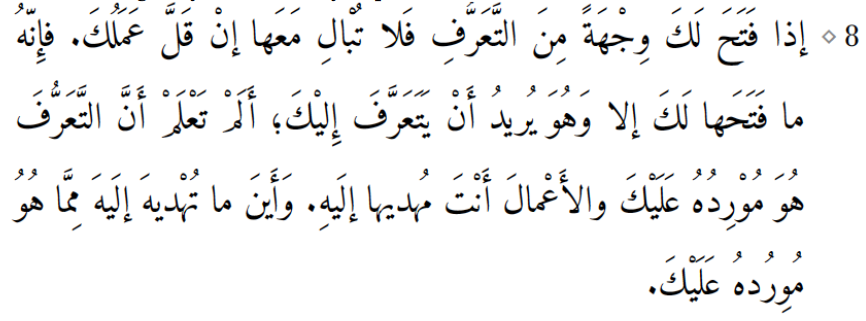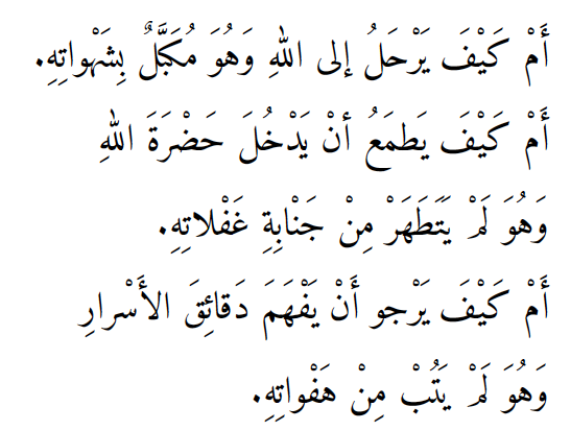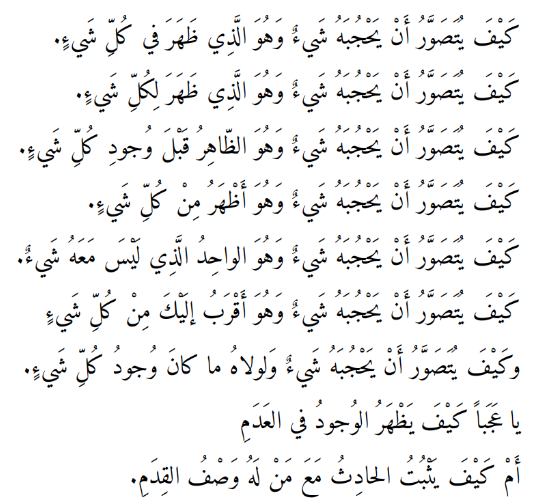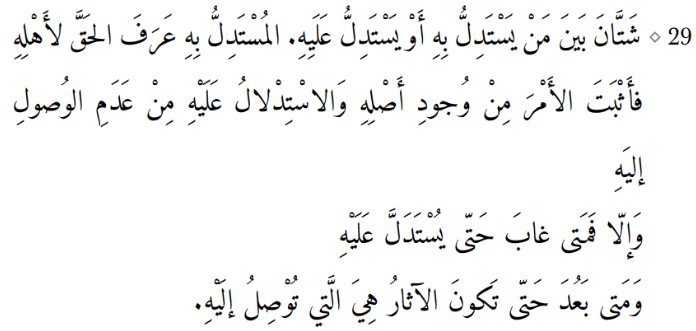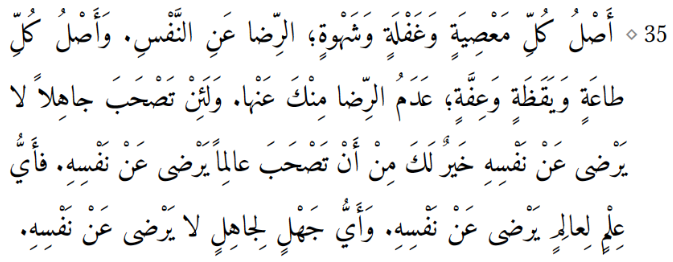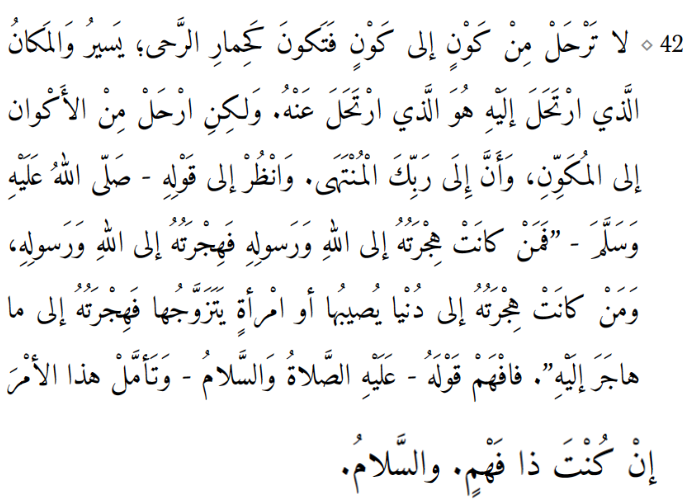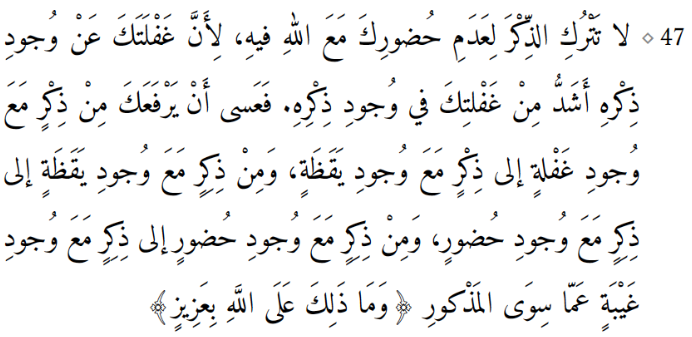Kitāb al-Ḥikam (1-50)
"The Book of Wisdoms", a collection of Sufi aphorisms
Ibn ʿAṭā Allāh al-Iskandarī (d. 709 AH/1310 CE)
 |
| Download audio commentary by Shaykh Walead Muhammad Mosaad here. |
1. One of the signs of relying on one’s own deeds
is the loss of hope when a downfall occurs.
2. Your desire to withdraw from everything,
when Allah has involved you in a world of means
is a hidden appetite.
And your desire for involvement in world of means
when Allāh has withdrawn you from it
is a comedown from lofty aspiration.
3. Aspiration that rushes on ahead
cannot pierce the walls of predestined Decrees.
4. Rest yourself from management,
for what Someone Else has carried out on your behalf
you must not yourself undertake to do it.
5. Your striving for what has already been guaranteed to you,
and your remissness in what is demanded of you,
are signs of the blurring of your intellect.
6. If in spite of intense supplication,
there is delay in timing of the Gift,
let that not be the cause for your despairing.
For He has guaranteed you a response
in what He chooses for you,
and at the time He desires, not the time you desire.
7. If what was promised does not occur,
even though the time for its occurence had been fixed,
then that must not make you doubt the promise.
Otherwise your intellect will be obscured
and the light of your innermost heart extinguished.
8. If He opens
a door for you, thereby making Himself known,
pay no heed if your deeds do not measure up to this,
For, in truth, He has not opened it for you but out of
a desire to make Himself known to you.
Do you not know that He is the one who presented
the knowledge of Himself to you, whereas you are the one
who presented Him with deeds? What a difference between
what He brings to you and what you present to Him!
9. Actions differ
because the inspirations of the states of being differ.
10. Actions are lifeless forms,
but the presence of an inner reality of sincerity (sirr al-ikhlāṣ) within them
is what endows them with a life-giving Spirit.
11. Bury yourself in the earth of obscurity,
for whatever sprouts forth,
without having first been buried,
flowers imperfectly.
12. Nothing benefits the heart more than a spiritual retreat
wherein it enters the domain of meditiation.
13. How can the heart be illumined
while the forms of creatures are reflected in its mirror?
Or how can it journey to Allāh
while shackled by its passions?
Or how can it desire to enter the presence of Allāh
while it has not yet purified itself
of the stain of forgetfulness?
Or how can it hope to grasp the subtleties of secret knowledge
while it has not turned away in regret from its lapses?
14. The Cosmos is all darkness.
It is only illumined by the manifestation of the Real in it.
Whoever sees the Cosmos and does not contemplate Him
in it, with it, before it or after it is in need of light.
You are veiled from the sun of gnosis
by the clouds of created things.
15. That which shows you the existence of His Omnipotence
Is that He veiled you from Himself
By that which cannot exist alongside Him.

16. How can it be conceived that something veils Him
since He is the one who is manifest through everything?
How can it be conceived that something veils Him
since He is the one who is manifest in everything?
How can it be conceived that something veils Him,
since He is the Manifest to everything?
How can it be conceived that something veils Him,
since He was the Manifest before the existence of anything?
How can it be conceived that something veils Him,
since He is more manifest than anything?
How can it be conceived that something veils Him,
since He is the One alongside of whom there is nothing?
How can it be conceived that something veils Him,
since He is nearer to you than anything else?
How can it be conceived that something veils Him,
since, were it not for Him, the existence of everything would not have been manifest?
It is a marvel how Being has manifested in nonbeing, and how the contingent has been established alongside of Him who possesses the attribute of Eternity!
other than what Allāh has manifested in it,
has not left ignorance behind at all!
18. Your postponement of deeds till the time you are free
is one of the frivolities of the ego.
19. Do not request him to get you out of a state
so as to make use of you in a different one;
for, were He to desire so, He could make use of you
as you are, without taking you out!
20. Hardly does the aspiration of the initiate desire to halt
at what has been unveiled to him.
Then the voices of Reality call out to him
"That which you are looking for is still ahead of you."
When the exterior aspects of created beings display their beauty to him,then their inner realities call out to him:
"We are only a trial, so disbelieve not." (Qurʾān 2:102)
21. Your requesting Him is suspecting Him,
Your seeking Him is due to your absence from Him,
Your seeking towards someone else is because of your
immodesty toward Him. Your requesting someone else
is on account of your distance from Him.
22. Not a breath do you expire,
but a Decree of Destiny makes it go forth.
23. Do not look forward to being free from alterities,
for that is indeed what cuts you off from vigilant attention to
Him in that very state He has assigned you.
24. So long as you are in the world,
be not surprised at the existence of sorrows.
For truly, it manifests nothing but what is in keeping
with its character or its inevitable nature.
25. No search pursued with the help of your Lord
remains at a standstill,
but any search pursued by yourself
will not be fruitful.
26. Among the signs of success at the end
is the turning to Allāh at the beginning.
27. He who is illumined at the beginning
is illumined at the end.
28. Whatever is manifested in the invisible world
of innermost hearts
is manifested in the visible world
of phenomena.
29. What a difference between one who proceeds from Allāh
in his argumentation
and one who proceeds inferentially to Him!
He who has Him as his starting-point knows the Real
as It is,
and proves any matter by reference to the
Being of its Origin!
But inferential argumentation
comes from the absence of union with Him.
Otherwise, when was it that he became absent
that one has to proceed inferentially to Him!
Or when was it that He became distant
that created things themselves will unite us to Him?
30. Those who are united with Him:
{Let him who has abundance spent out of his abundance.}
Those who are voyaging toward Him:
{And whoever has his means of subsistence straitened....}
31. Those who are voyaging to Him
are guided by the lights of their orientation,
whereas those who are united to Him
have the lights of face-to-face confrontation.
The former belong to their lights,
whereas the lights belong to the latter,
for they belong to Allāh and to nothing apart from Him.
{Say: Allāh! Then leave them prattling in their vain talk.}
32. Your being on the lookout for the vices hidden within you
is better than your being on the lookout for the
invisible realities veiled from you.
33. The Real is not veiled from you.
Rather, it is you who are veiled from seeing It;
for, were anything to veil It,
then that which veils It would cover It.
But if there were a covering to It,
then that would be a limitation to Its Being:
Every limitation to anything has power over it.
{And He is the Omnipotent, above His servants.}
34. Among the attributes of your human nature,
draw away
from every one that is incompatible with your servanthood,
so that you may be responsive to the call of Allāh
and near His Presence.
35. The source
of every disobedience, indifference, and passion
is self-satisfaction.
The source
of every obedience, vigilance, and virtue
is dissatisfaction with one’s self.
It is better for you to keep company with an ignorant man
dissatisfied with himself
than to keep company with a learned man
satisfied with himself.
For what knowledge is there in a self-satisfied scholar?
And what ignorance is there in an unlearned man
dissatisfied with himself?
36. The ray of light of the intellect
makes you witness His nearness to you.
The eye of the intellect
makes you witness your nonbeing as due to His Being.
The Truth of the intellect
makes you witness His Being,
not your nonbeing, nor your being.
37. "Allāh was and there was nothing with Him,
and He is now as He was"
38. Let not the intention of your aspiration shift
to what is other than He,
for one’s hopes cannot outstrip the Generous.
to what is other than He,
for one’s hopes cannot outstrip the Generous.
39. Appeal to no one but Him to relieve you of a pressing need
that He Himself has brought upon you.
For how can someone else remove what He has imposed?
And how can he who is unable to free himself
of a pressing need
free someone else of one?
40. If you have not improved your thinking of Him
because of His ineffable nature,improve it because of His treatment of you.
For has He accustomed you to anything but what is good?
And has He conferred upon you anything but His favours?
41. How astonishing is he who flees from what is inescapable
and searches for what is evanescent!
{For surely it is not the eyes that are blind,
but blind are the hearts which are in the chests.}
42. Travel not from creature to creature,
otherwise you will be like a donkey at the mill:
Roundabout he turns, his goal the same as his departure.
Rather, go from creatures to the Creator:
“And that the final end is unto thy Lord.”
Consider the Prophet’s words
(God bless him and grant him peace!):
“Therefore, he whose flight is for Allāh and His Messenger,
then his flight is for Allāh and His Messenger;
and he whose flight is for worldly gain
or marriage with a woman
then his flight is for that which he flees to.”
So understand his words (upon him peace!)
and ponder this matter, if you can.
And peace on you!
43. Do not keep company
with anyone whose state does not inspire you
and whose speech does not lead you
to Allāh.
44. You might be in a bad state; then,
associating with one who is in a worse state,
you see virtue in yourself.
45. No deed arising from a renouncing heart is small,
and no deed arising from an avaricious heart is fruitful.
46. Good works are the result of good states.
Good states
arise from the stations wherein abide
those who have spiritual realisation.
47. Do not abandon the Invocation
because you do not feel the Presence of Allāh therein.
For your forgetfulness of the Invocation of Him
is worse than your forgetfulness in the Invocation of Him.
Perhaps He will take you from an Invocation with
forgetfulness
to one with vigilance, and from one with vigilance
to one with the Presence of Allāh, and from one with the
Presence of Allāh
to one wherein everything but the Invoked is absent.
{And that is not difficult for Allāh.}
48. A sign of the heart’s death
is the absence of sadness over the acts of obedience you have neglected
and the abandonment of regret
over the mistakes you have made.
49. Let no sin reach such proportions in your eyes
that it cuts you off from having a good opinion of Allāhfor, indeed, whoever knows his Lord
considers his sin as paltry next to His generosity.
50. There is no minor sin when His justice confronts you;
and there is no major sin when His grace confronts you.





